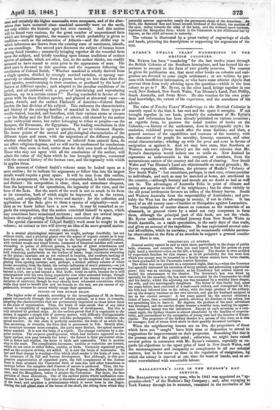BYRNE'S TWELVE YEARS' WANDERINGS IN THE BRITISH COLONIES.
MR. BYRNE has been "wandering" for the last twelve years through the British Colonies of the Southern hemisphere, and has turned his ex- perience to account in the form of two goodly octavoes. The reasons he gives for publication are, that most other books on colonies and emi- gration are devoted to some single settlement; or are written by per- sons with insufficient information, or who have some ulterior objects that prevent them from truly advising upon the question—which is the best colony to go to ? Mr. Byrne, on the other hand, brings together in one work New Zealand, New South Wales, Van Diemen's Land, Port Phillip, South Australia, and Swan River. He also vouches for his own prac- tical knowledge, the extent of his experience, and the soundness of his advice.
The value of Twelve Years' Wanderings in the British Colonies 0 scarcely equal to the time it has cost and the apace it occupies. If nOt brought together one book, probably the substance of Mr. Byhe's facts and information has been already published on various occasions; as regards form, he pursues the usual routine of books on the Colonies,—a history of the settlement, done in encydoptedic style; its statistics, exhibited pretty much after the same fashion ; and then, a general account of the capabilities and customs of the country, with the character of its people for morality, honesty, manners, and other social characteristics; winding up with the pros and cons in favour of emigration or against it. And we may here state, that Southern or Western Australia (Swan River) are the only two colonies that Mr. Byrne's description would induce one to settle at. New Zealand he represents as unfavourable to the reception of numbers, from the mountainous nature of the country and the cost of clearing. New South Wales and Van Diemen's Land are objectionable on moral grounds ; Mr. Byrne repeating, with additions, the pictures of Mudie's "Felonry of New South Wales " : but sometimes, perhaps, in each case, crimes peculiar to individuals, and such as may be matched at home, are attributed to the country,—although honesty and morals are no doubt as bad as well can be. The advantages of Australia Felix in point of climate and society are superior to either of its neighbours ; but its close vicinity to the old penal settlements favours an influx of the felonry leaven. South and Western Australia form the respectability of Australasia ; and pro- bably the West has the advantage in society, if not in riches. It has more of an old county cast—Cheshire or Shropshire against Lancashire.
The compilation of matter almost as common as the materials of an almanack, or general views by a mind not very competent to form them, although the principal part of this book, are not the whole. Mr. Byrne undertook an overland journey from New South Wales to South Anstralia, on a cattle speculation, in the early days of that trade, and gives an account of the expedition. He has experienced several colo- nial adventures, which he narrateas and he occasionally exhibits particu- lar observations in the fbrm of an anecdote to support a general conclu- sion. Here is one.
THEATRICALS AT SYDNEY.
General society cannot be said to exist there, particularly in the shape of public balls, reunions, and concerts, when you may expect to find the person on your right hand a murderer—him on the left, a burglar. The theatre is even avoided by respectable families for this reason; as in all probability the box next that which you occupy may be tenanted by a family whose seniors have borne chains, or have graduated in the Paraniatta convict factories. The writer was once present on a command night, that is,—when the Governor had specially intimated his intention of being present, and patronizing a particular piece: this was an exciting occasion, as his Excellency but seldom indeed ex- tended his countenance to the theatre. The Governor's box was fitted up specially for the occasion; the box next was occupied by the Commander-in-chief and his family; whilst the adjoining one was tenanted by a wealthy linen-draper, his wife, and two marriageable daughters. The father of this family had, some ten years before, been convicted of a mail-coach robbery, and transported for life; his wife had followed him to the colony, with the large produce of the robbery, set up the drapery business on her own account, and got her husband assigned to her as her convict servant! A few years passed on; the convict obtained a ticket of leave, then a conditional pardon, allowing his freedom in the colony, but not permitting him to leave it. By degrees, the produce of the mail adventure was developed, and the convict draper became a wealthy man, making his appear- ance wherever money was the introducer. Except on such occasions as a com- mand night, the Sydney theatre is almost abandoned by the families of respecta- bility, and surrendered to the occupation of young men and the families of Email- cipists. The proprietor of the Sydney theatre is a person of this class, as is she its manager; both of whom drive about in their gaudily decorated carriages. When the neighbouring houses are on fire, the proprietors of those which have not " caught" have little time or disposition to attend to suggestions for improvements on their properties. Something like this is the present state of the public mind ; otherwise, we might have raised several points in connexion with Mr. Byrne's volumes, especially as re- gards his objections to the upset price of land in New South Wales, and the mismanagement and incapacity so conspicuous in all our colonial matters, but in few more so than in the regulation of emigration, by which the colony is starved at one time for want of hands, and at an- other overwhelmed with unsuitable labour.


























 Previous page
Previous page